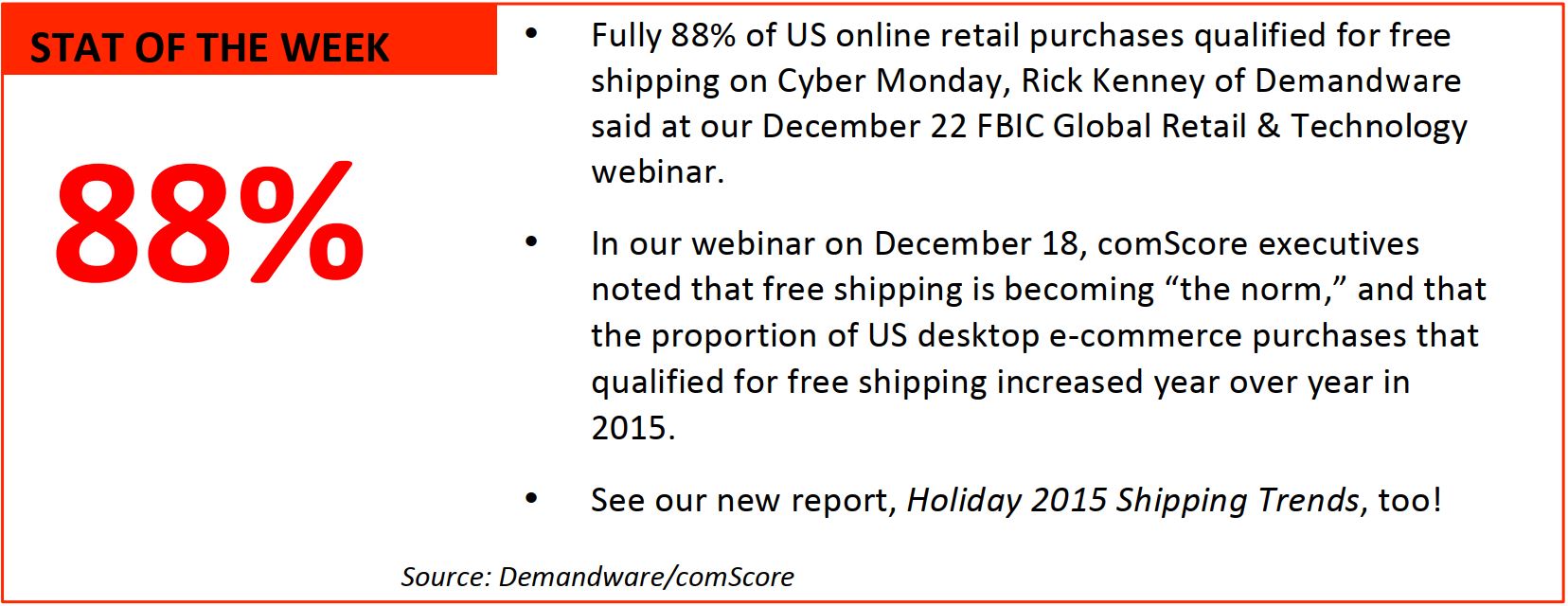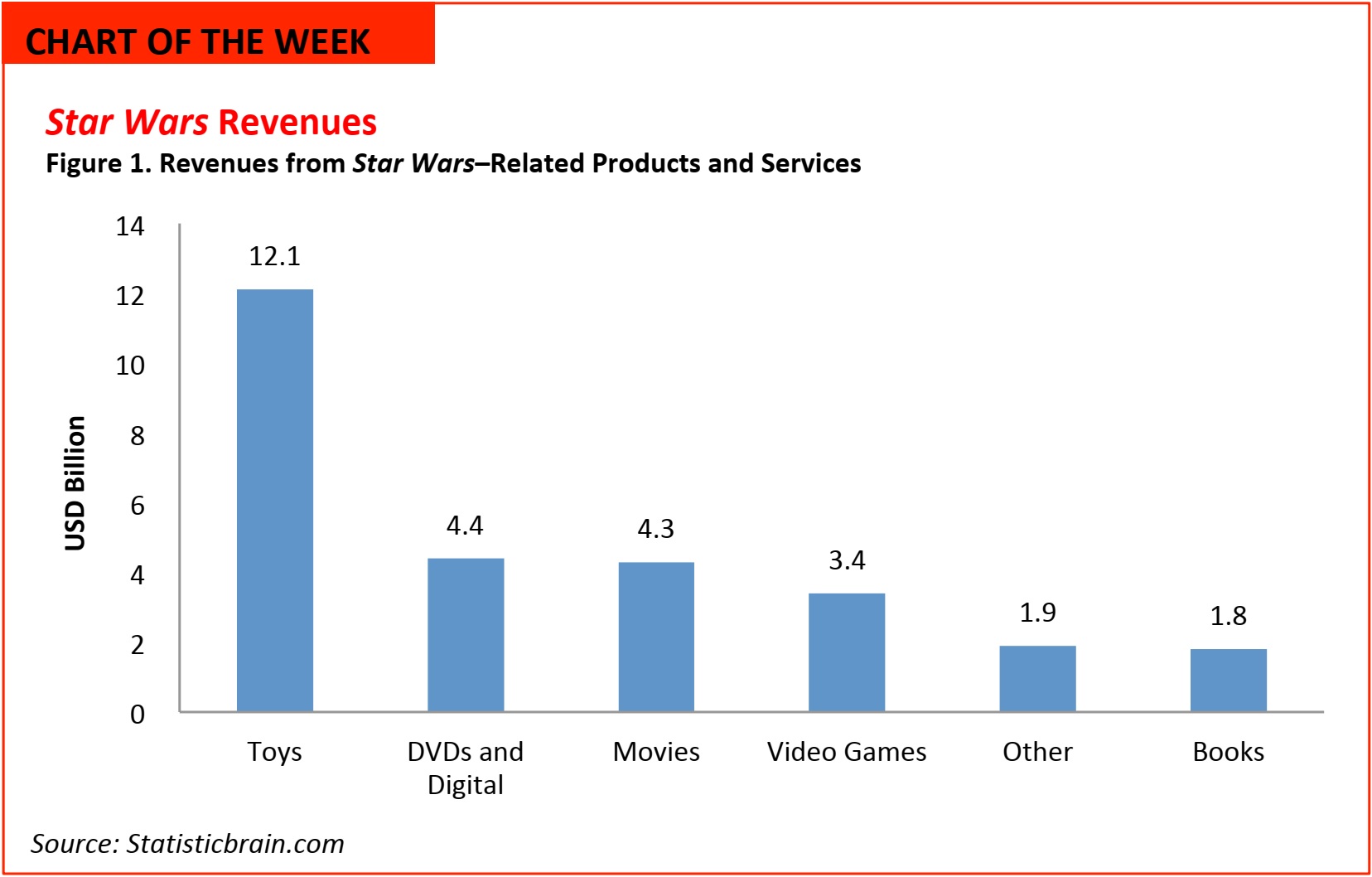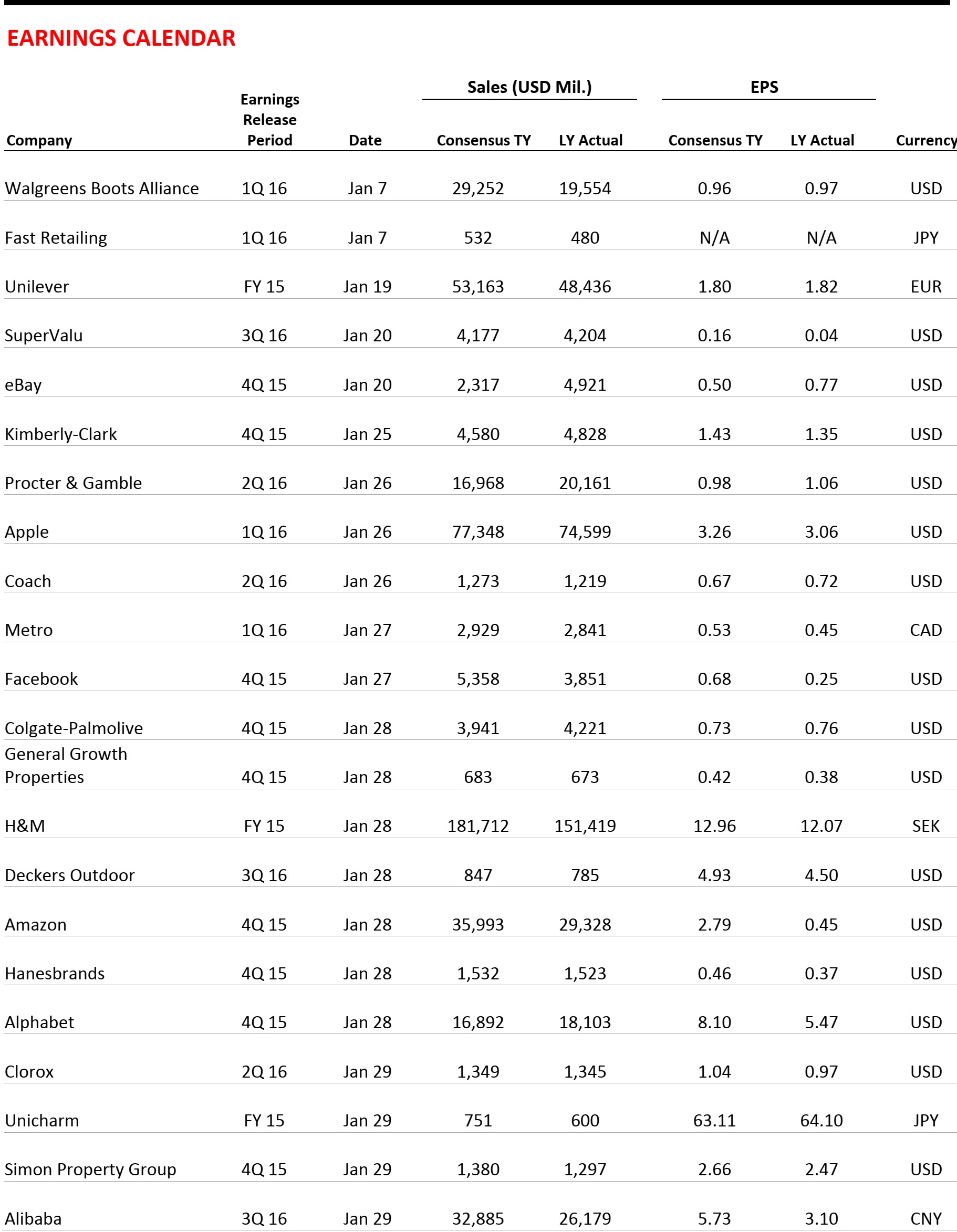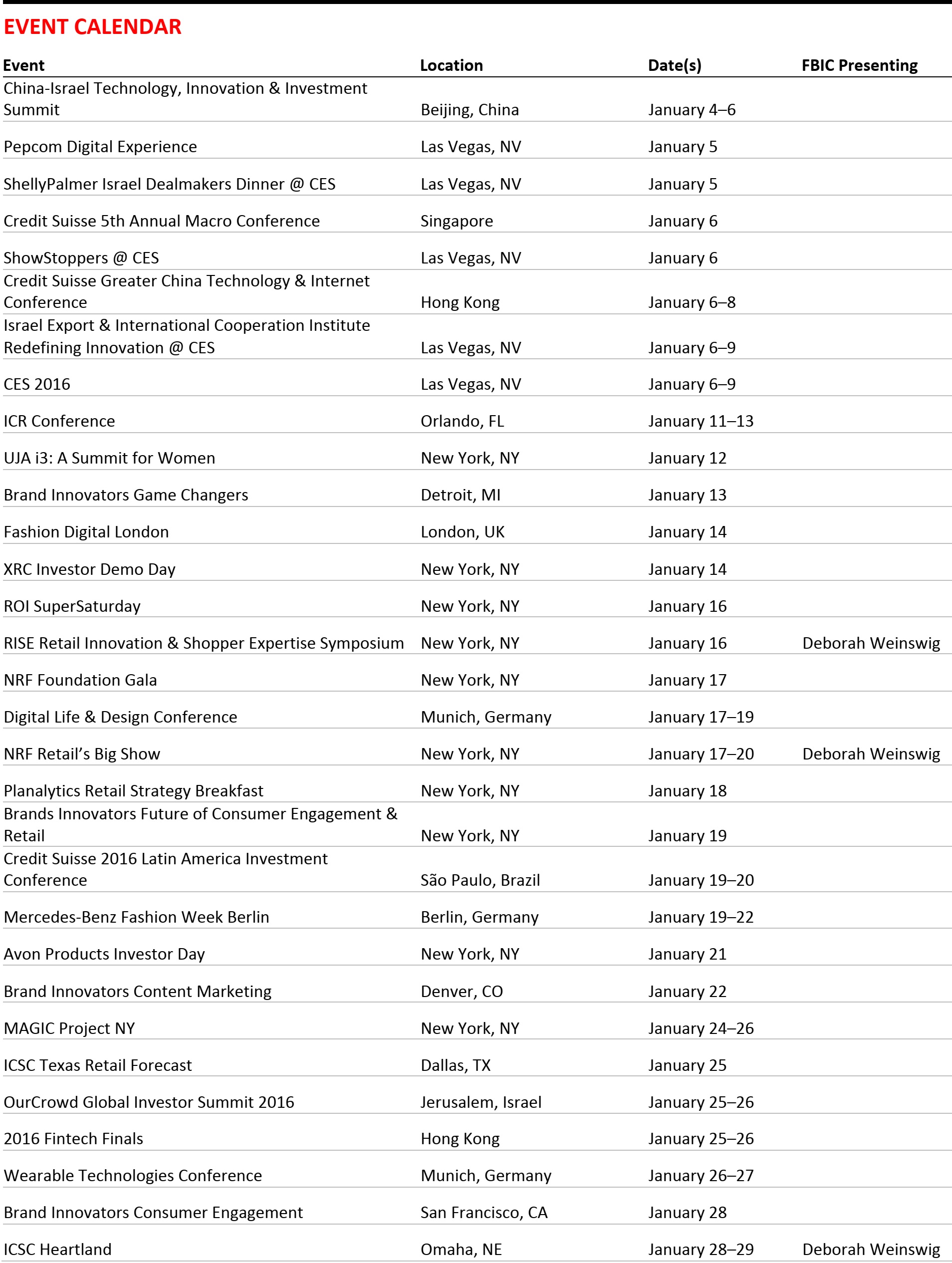
FROM THE DESK OF DEBORAH WEINSWIG
 This week, we stood in line to see the film Star Wars: The Force Awakens, which generated an estimated $48 million in ticket presales and another $248 million in US ticket sales, along with $279 million in international sales, over just its opening weekend. Ticket presales began October 20, and opening night tickets quickly sold out. On opening night, December 17, many theaters offered showings all night long to accommodate the hordes of fans eagerly awaiting the return of Luke, Leia, Han Solo and Chewbacca, as well as the next generation of Star Wars characters and droids.
The Star Wars franchise is big business: it is a multibillion-dollar revenue opportunity that generates much-welcomed revenue for cinemas, toymakers, DVD factories, retailers, book publishers and, of course, Disney, which purchased Lucasfilm, the studio behind the franchise, for $4 billion in 2012. Disney’s purchase was a clear winner: US box-office receipts for The Force Awakens bumped Jurassic World from its position as the record holder for a film debut, and estimates of total revenue for the former are running as high as $4 billion. Recall that The Force Awakens is just Episode VII in the series—there are two more episodes in the works, following George Lucas’s original plan for a total of nine episodes.
In the run-up to the movie debut, the Star Wars brand appeared to be everywhere, and it still does. Its marketing droids are operating at full efficiency, and we are saturated with advertisements for Star Wars–themed products, including Dodge and Jeep cars, CoverGirl makeup, Verizon telecom services, Crocs shoes and even credit cards featuring images of Yoda, the droids and Darth Vader.
The Star Wars galaxy, including presales for The Force Awakens, extends across $28 billion of revenue, comprising not just the movies, but sales of DVDs and other formats, books, toys, and other products. Dividing this figure by the six major preceding movies results in an average of more than $4 billion per film.
The biggest hyperdrive in the Star Wars universe is, surprisingly, toys, which account for $12 billion of the $28 billion in revenue. Only $4.3 billion of the total derives from box office receipts for the movies. Moreover, Star Wars action figures can have significant investment value—one private collection of items recently sold for $500,000 at auction, and one rare Luke Skywalker figure sold for $25,000.
Star Wars toys are among the hot sellers this holiday season, and we featured two of them in our Holiday Price Tracker: the Star Wars Bladebuilders Jedi Master Lightsaber and the LEGO Star Wars 75097 Advent Calendar Developmental Building Kit. Retailers say that Star Wars toys are flying off the shelves, and one estimate calls for $3 to $5 billion in merchandise sales this holiday season, surpassing the total for Cars 2 merchandise, which took in $3 billion, and Frozen merchandise, which took in $1 billion. In one survey, 31% of shoppers said they planned to buy Star Wars gifts for 6- to 10-year-olds. While royalties of 10%–12% are typical, one expert speculated that Disney will likely receive 20% of product sales in licensing fees.
The empire of Star Wars product marketing has struck back, and it appears to be on track for huge commercial success for all stakeholders, including studios, cinemas, cable channels, toymakers and retailers. Although the three preceding films (Episodes I–III) were a commercial success, fans were unimpressed with their plots. The new film, however, is likely to please old fans and engage new ones in the franchise. With at least two more films to come, The Force Awakens is likely to enable Star Wars to generate billions of dollars for participants over the next decade.
May the Force be with us!
This week, we stood in line to see the film Star Wars: The Force Awakens, which generated an estimated $48 million in ticket presales and another $248 million in US ticket sales, along with $279 million in international sales, over just its opening weekend. Ticket presales began October 20, and opening night tickets quickly sold out. On opening night, December 17, many theaters offered showings all night long to accommodate the hordes of fans eagerly awaiting the return of Luke, Leia, Han Solo and Chewbacca, as well as the next generation of Star Wars characters and droids.
The Star Wars franchise is big business: it is a multibillion-dollar revenue opportunity that generates much-welcomed revenue for cinemas, toymakers, DVD factories, retailers, book publishers and, of course, Disney, which purchased Lucasfilm, the studio behind the franchise, for $4 billion in 2012. Disney’s purchase was a clear winner: US box-office receipts for The Force Awakens bumped Jurassic World from its position as the record holder for a film debut, and estimates of total revenue for the former are running as high as $4 billion. Recall that The Force Awakens is just Episode VII in the series—there are two more episodes in the works, following George Lucas’s original plan for a total of nine episodes.
In the run-up to the movie debut, the Star Wars brand appeared to be everywhere, and it still does. Its marketing droids are operating at full efficiency, and we are saturated with advertisements for Star Wars–themed products, including Dodge and Jeep cars, CoverGirl makeup, Verizon telecom services, Crocs shoes and even credit cards featuring images of Yoda, the droids and Darth Vader.
The Star Wars galaxy, including presales for The Force Awakens, extends across $28 billion of revenue, comprising not just the movies, but sales of DVDs and other formats, books, toys, and other products. Dividing this figure by the six major preceding movies results in an average of more than $4 billion per film.
The biggest hyperdrive in the Star Wars universe is, surprisingly, toys, which account for $12 billion of the $28 billion in revenue. Only $4.3 billion of the total derives from box office receipts for the movies. Moreover, Star Wars action figures can have significant investment value—one private collection of items recently sold for $500,000 at auction, and one rare Luke Skywalker figure sold for $25,000.
Star Wars toys are among the hot sellers this holiday season, and we featured two of them in our Holiday Price Tracker: the Star Wars Bladebuilders Jedi Master Lightsaber and the LEGO Star Wars 75097 Advent Calendar Developmental Building Kit. Retailers say that Star Wars toys are flying off the shelves, and one estimate calls for $3 to $5 billion in merchandise sales this holiday season, surpassing the total for Cars 2 merchandise, which took in $3 billion, and Frozen merchandise, which took in $1 billion. In one survey, 31% of shoppers said they planned to buy Star Wars gifts for 6- to 10-year-olds. While royalties of 10%–12% are typical, one expert speculated that Disney will likely receive 20% of product sales in licensing fees.
The empire of Star Wars product marketing has struck back, and it appears to be on track for huge commercial success for all stakeholders, including studios, cinemas, cable channels, toymakers and retailers. Although the three preceding films (Episodes I–III) were a commercial success, fans were unimpressed with their plots. The new film, however, is likely to please old fans and engage new ones in the franchise. With at least two more films to come, The Force Awakens is likely to enable Star Wars to generate billions of dollars for participants over the next decade.
May the Force be with us!



Source: Statisticbrain.com
- Star Wars: The Force Awakens smashed box-office records for a movie debut last weekend, taking in worldwide ticket sales of $529 million. But according to researchers at Statistic Brain, nearly three times as much is spent on Star Wars–themed toys as on cinema tickets.
- In total, $28 billion has been spent on Star Wars–themed products and services, but only $4.3 billion of that was spent on watching the movies (excluding DVDs and digital).
- For more, see our new report, The Star Wars Economy.
US RETAIL HEADLINES
 Amazon Seeks to Ease Ties with UPS
(December 22) The Wall Street Journal
Amazon Seeks to Ease Ties with UPS
(December 22) The Wall Street Journal
- Rising package volumes and costs have Amazon seeking alternative delivery routes—shifting its role from one of UPS’s key allies to a potentially disruptive competitor. Amazon has held talks with air-cargo companies to lease airplanes and build its own freight operation. The goal is to reduce its reliance on carriers like UPS, according to people familiar with the matter..
- Amazon is already using its own trucks, drivers and a fleet of couriers for the final and most-expensive leg of an order’s trip. Eventually, it hopes to get drones to drop packages into backyards. Such steps are part of a much broader plan at Amazon, which counts shipping costs as one of its fastest-growing expenses, totaling 11.7% of revenue in the third quarter, up from 10.4% a year ago.
 Ford in Talks with Google to Build Self-Driving Cars
(December 22) Reuters
Ford in Talks with Google to Build Self-Driving Cars
(December 22) Reuters
- Automotive News, citing a person with knowledge of the project, reported that Google is talking with automaker Ford regarding the former’s autonomous car development. The contract manufacturing deal, if finalized, is expected to come during the annual Consumer Electronics Show in Las Vegas during the first week of January.
- Earlier this year, Google began discussions with most of the world’s top automakers, and assembled a team of traditional and nontraditional suppliers to speed its efforts to bring self-driving cars to the market by 2020. In June, it began testing tiny, self-driving prototype vehicles of its own design on public roads around Mountain View, California. The company has also started testing self-driving prototypes in Austin, Texas.
 Nike Plans to Boost Its E-Commerce Sales from $1 Billion Today to $7 Billion in 2020
(December 23) Business Insider
Nike Plans to Boost Its E-Commerce Sales from $1 Billion Today to $7 Billion in 2020
(December 23) Business Insider
- Nike currently makes just over a billion dollars annually through its e-commerce channels. The company expects investments over the next four years to push that total to $7 billion.
- By 2020, Nike expects 4 billion people with a mobile device and disposable income to live in an area where there is a Nike store. The company’s aggressive expansion plan includes more successfully linking its stores with online inventory and providing a larger web sales offering in more markets.
 Elon Musk’s SpaceX Returns to Flight; Pulls Off Dramatic, Historic Landing
(December 22) The Washington Post
Elon Musk’s SpaceX Returns to Flight; Pulls Off Dramatic, Historic Landing
(December 22) The Washington Post
- Elon Musk’s SpaceX successfully landed the first stage of its Falcon 9 rocket on Monday evening. It was the company’s first flight since its rocket exploded six months ago and the first time a rocket had launched a payload into orbit and then returned safely to Earth. The news was cheered as a sign that SpaceX has gotten its momentum back.
- Monday’s flight, initially delayed because of technical concerns, was the second time in a month that a billionaire-backed venture launched a rocket into space and recovered it. And it represents yet another significant step forward in the quest to open up the cosmos to the masses.
EUROPE RETAIL HEADLINES
 UK Store Traffic Falls on Super Saturday
(December 21) Cityam.com
UK Store Traffic Falls on Super Saturday
(December 21) Cityam.com
- Footfall slumped across UK high streets and shopping centers on “Super Saturday,” the final Saturday before Christmas. Total footfall was down by 4.5% year over year, according to analysts at Springboard. Shopping center traffic was down by 8.9% year over year and high-street footfall was down by 5.5%, although retail park traffic was up by 3.3%.
- Research from rival retail intelligence firm FootFall found a 4.3% decline in footfall on Super Saturday. However, FootFall predicts a rebound in the final week before Christmas. The company says it saw a similar pattern in 2009, when Christmas also fell on a Friday, and that stores saw a flurry of last-minute shopping.
 More Strikes at Amazon Germany
(December 21) Retaildetail.eu
More Strikes at Amazon Germany
(December 21) Retaildetail.eu
- German trade union Verdi this week called for further strikes at Amazon Germany ahead of Christmas Day. Six out of the company’s nine distribution centers are expected to be hit by strikes.
- Strikes have long been a feature at Amazon Germany’s distribution centers, as unions demand that workers be recognized as retail employees, not logistics-industry workers; the two sectors have different compensation standards.
 Casino to Exit Vietnam
(December 15 and 17) Company press releases and Ft.com
Casino to Exit Vietnam
(December 15 and 17) Company press releases and Ft.com
- French supermarket retailer Casino Group announced plans this week to exit the Vietnamese market and undertake real estate transactions in Thailand and Colombia that are aimed at “externalizing the value” of its real estate. Collectively, the moves will form a €2 billion deleveraging plan.
- Two days after the plans were announced, short seller and research firm Muddy Waters Research blasted Casino Group as “one of the most overvalued and misunderstood companies” it had ever come across. Muddy Waters said Casino Group’s financial statements are “literally meaningless” because they fully consolidate results from companies in which Casino Group has a minority share. Casino Group responded by saying that the Muddy Waters report contained “grossly erroneous allegations.”
 Carrefour to Acquire Billa Romania
(December 22) Company press release
Carrefour to Acquire Billa Romania
(December 22) Company press release
- French grocery giant Carrefour has announced an agreement to acquire the Billa supermarket chain in Romania from Germany’s Rewe Group. The chain consists of 86 supermarkets with a total sales area of 83,000 square meters.
- Carrefour said the acquisition would make it “the leading supermarket operator in Romania,” and that the chain would strengthen its “multiformat offer.” Billa’s smaller-store format is distinct from the large hypermarkets for which Carrefour is best known.

Lagardère Brings Robots to Travel Retail
(December 21) Eprretailnews.com
- France’s Lagardère Travel Retail has introduced a robot to serve customers at Auckland Airport in New Zealand, the Automated Collection Experience (ACE). The ACE robot serves customers who have preordered duty-free goods, selecting the relevant box of goods from a bank of crates and delivering it to the customer.
- The robotic-arm-style device is four meters high and operates behind glass, so shoppers can view the order retrieval process. The robot is in operation at the Aelia Duty Free store in Auckland.
ASIA TECH HEADLINES
 China Has Made a Ridiculous Number of Phones So Far This Year
(December 22) TechinAsia
China Has Made a Ridiculous Number of Phones So Far This Year
(December 22) TechinAsia
- According to new data released by China’s Ministry of Industry and Information Technology, China’s production of mobile phones is up year over year, to 1.6 billion in the first 11 months of 2015.
- According to Gartner data, global mobile phone sales in 2014 totaled about 1.8 billion. By the end of 2015, China will have produced about as many mobile phones as the total number sold across the globe in 2014.
 Sanrio Probes Reported “Hello Kitty” Hack Exposing 3.3 Million Users
(December 22) Channel NewsAsia
Sanrio Probes Reported “Hello Kitty” Hack Exposing 3.3 Million Users
(December 22) Channel NewsAsia
- On Monday, Sanrio, the Japanese owner of the Hello Kitty brand, said it was investigating a report that its database had been hacked and that private information on 3.3 million users had been exposed.
- The data came from the Japanese toy company’s fan site and includes information such as users’ full names, email addresses and encrypted passwords, according to a report by security website CSOonline.com.
 Hong Kong’s Popmap Lets You Shop Like a Local
(December 21) e27.co
Hong Kong’s Popmap Lets You Shop Like a Local
(December 21) e27.co
- Popmap connects independent shops and niche brands around the world with online shoppers looking to purchase something unique. It features items from local and boutique stores on its site and app. Customers can purchase items from these shops from anywhere around the world.
- Launched in mid-2015, Popmap is currently working with over 700 shops in 53 cities worldwide, a figure that Co-Founder and CEO Idris Sersoub plans to double in the next six months. Vendors are charged 15% under Popmap’s business model.
 Gadgets from “Japan’s Xiaomi” Now Available in Singapore
(December 19) TechinAsia
Gadgets from “Japan’s Xiaomi” Now Available in Singapore
(December 19) TechinAsia
- Tokyo-based UPQ burst onto the Asian startup scene last summer when it came out of stealth mode to reveal more than a dozen original consumer electronics products, ranging from a budget Android phone to a 4K monitor.
- The full product range is available online and at brick-and-mortar electronics stores in Tokyo, but now two of its gadgets are also available in Singapore via e-commerce giant Lazada. UPQ Founder Yuko Nakazawa is planning to add more UPQ products to Lazada, and extend availability to additional Asian countries in 2016.
 Apply Pay Coming to China Next Year
(December 18) TechinAsia
Apply Pay Coming to China Next Year
(December 18) TechinAsia
- Apply Pay will be available in Mainland China in early 2016, according to a statement released by Apple. The company has partnered with China UnionPay, the main card company used by Chinese banks.
- It will chase after WeChat and Alipay: the former’s WeChat Wallet grew through peer-to-peer transfers and in-app purchases, while the latter was fueled by its use on Taobao.
LATAM RETAIL HEADLINES
 Krispy Kreme Expands Further in Latin America with Shops in Panama
(December 21) Winston-Salem Journal
Krispy Kreme Expands Further in Latin America with Shops in Panama
(December 21) Winston-Salem Journal
- Krispy Kreme Doughnuts, in partnership with Barcenas Group International, plans to expand further in Central America, opening 16 franchises in Panama by the end of 2020.
- The company currently has franchises in Guatemala, as well as shops in Colombia, Puerto Rico and the Dominican Republic. In September, Krispy Kreme announced plans for 24 franchisee shops in Peru and 12 in Bolivia.
 El Palacio Plans to Double Private-Label Business
(December 18) WWD.com
El Palacio Plans to Double Private-Label Business
(December 18) WWD.com
- Mexico’s El Palacio de Hierro plans to increase its private-label clothing revenues by nearly 50%, to MXN 650 million (US$39.3 million) by 2019.
- The company plans to accomplish this by growing its Chester & Peck, Epsilon and Pertegaz brands and by operating 100 points of sale by 2019.
 Brazil Lifts Temporary Ban on WhatsApp
(December 17) The Wall Street Journal
Brazil Lifts Temporary Ban on WhatsApp
(December 17) The Wall Street Journal
- On December 17, a Brazilian judge lifted a ban on Facebook’s WhatsApp app, which had been blocked for 48 hours following complaints by Brazilian telecom service providers.
- WhatsApp is extremely popular in Brazil, and approximately half of its 200 million people—including many lower-income Brazilians—regularly use its free texting and voice messaging functions. WhatsApp was the most downloaded app in the country last year, and Brazil is the world’s fourth-largest smartphone market.
 Weakening Latin American Economies May Slow Growth in South Florida
(December 18 and 20) Miami Herald
Weakening Latin American Economies May Slow Growth in South Florida
(December 18 and 20) Miami Herald
- The key industries in South Florida—construction, retail, tourism and trade—are showing early signs of slowing due to weakening overseas economies.
- Many Latin American economies are currently in recession, and Argentina’s peso dropped by 30% last Thursday after the government removed capital controls. Brazil’s credit rating was recently reduced to below investment grade by two rating agencies. Venezuela, with its struggling economy, also has strong economic ties to South Florida.




 This week, we stood in line to see the film Star Wars: The Force Awakens, which generated an estimated $48 million in ticket presales and another $248 million in US ticket sales, along with $279 million in international sales, over just its opening weekend. Ticket presales began October 20, and opening night tickets quickly sold out. On opening night, December 17, many theaters offered showings all night long to accommodate the hordes of fans eagerly awaiting the return of Luke, Leia, Han Solo and Chewbacca, as well as the next generation of Star Wars characters and droids.
The Star Wars franchise is big business: it is a multibillion-dollar revenue opportunity that generates much-welcomed revenue for cinemas, toymakers, DVD factories, retailers, book publishers and, of course, Disney, which purchased Lucasfilm, the studio behind the franchise, for $4 billion in 2012. Disney’s purchase was a clear winner: US box-office receipts for The Force Awakens bumped Jurassic World from its position as the record holder for a film debut, and estimates of total revenue for the former are running as high as $4 billion. Recall that The Force Awakens is just Episode VII in the series—there are two more episodes in the works, following George Lucas’s original plan for a total of nine episodes.
In the run-up to the movie debut, the Star Wars brand appeared to be everywhere, and it still does. Its marketing droids are operating at full efficiency, and we are saturated with advertisements for Star Wars–themed products, including Dodge and Jeep cars, CoverGirl makeup, Verizon telecom services, Crocs shoes and even credit cards featuring images of Yoda, the droids and Darth Vader.
The Star Wars galaxy, including presales for The Force Awakens, extends across $28 billion of revenue, comprising not just the movies, but sales of DVDs and other formats, books, toys, and other products. Dividing this figure by the six major preceding movies results in an average of more than $4 billion per film.
The biggest hyperdrive in the Star Wars universe is, surprisingly, toys, which account for $12 billion of the $28 billion in revenue. Only $4.3 billion of the total derives from box office receipts for the movies. Moreover, Star Wars action figures can have significant investment value—one private collection of items recently sold for $500,000 at auction, and one rare Luke Skywalker figure sold for $25,000.
Star Wars toys are among the hot sellers this holiday season, and we featured two of them in our Holiday Price Tracker: the Star Wars Bladebuilders Jedi Master Lightsaber and the LEGO Star Wars 75097 Advent Calendar Developmental Building Kit. Retailers say that Star Wars toys are flying off the shelves, and one estimate calls for $3 to $5 billion in merchandise sales this holiday season, surpassing the total for Cars 2 merchandise, which took in $3 billion, and Frozen merchandise, which took in $1 billion. In one survey, 31% of shoppers said they planned to buy Star Wars gifts for 6- to 10-year-olds. While royalties of 10%–12% are typical, one expert speculated that Disney will likely receive 20% of product sales in licensing fees.
The empire of Star Wars product marketing has struck back, and it appears to be on track for huge commercial success for all stakeholders, including studios, cinemas, cable channels, toymakers and retailers. Although the three preceding films (Episodes I–III) were a commercial success, fans were unimpressed with their plots. The new film, however, is likely to please old fans and engage new ones in the franchise. With at least two more films to come, The Force Awakens is likely to enable Star Wars to generate billions of dollars for participants over the next decade.
May the Force be with us!
This week, we stood in line to see the film Star Wars: The Force Awakens, which generated an estimated $48 million in ticket presales and another $248 million in US ticket sales, along with $279 million in international sales, over just its opening weekend. Ticket presales began October 20, and opening night tickets quickly sold out. On opening night, December 17, many theaters offered showings all night long to accommodate the hordes of fans eagerly awaiting the return of Luke, Leia, Han Solo and Chewbacca, as well as the next generation of Star Wars characters and droids.
The Star Wars franchise is big business: it is a multibillion-dollar revenue opportunity that generates much-welcomed revenue for cinemas, toymakers, DVD factories, retailers, book publishers and, of course, Disney, which purchased Lucasfilm, the studio behind the franchise, for $4 billion in 2012. Disney’s purchase was a clear winner: US box-office receipts for The Force Awakens bumped Jurassic World from its position as the record holder for a film debut, and estimates of total revenue for the former are running as high as $4 billion. Recall that The Force Awakens is just Episode VII in the series—there are two more episodes in the works, following George Lucas’s original plan for a total of nine episodes.
In the run-up to the movie debut, the Star Wars brand appeared to be everywhere, and it still does. Its marketing droids are operating at full efficiency, and we are saturated with advertisements for Star Wars–themed products, including Dodge and Jeep cars, CoverGirl makeup, Verizon telecom services, Crocs shoes and even credit cards featuring images of Yoda, the droids and Darth Vader.
The Star Wars galaxy, including presales for The Force Awakens, extends across $28 billion of revenue, comprising not just the movies, but sales of DVDs and other formats, books, toys, and other products. Dividing this figure by the six major preceding movies results in an average of more than $4 billion per film.
The biggest hyperdrive in the Star Wars universe is, surprisingly, toys, which account for $12 billion of the $28 billion in revenue. Only $4.3 billion of the total derives from box office receipts for the movies. Moreover, Star Wars action figures can have significant investment value—one private collection of items recently sold for $500,000 at auction, and one rare Luke Skywalker figure sold for $25,000.
Star Wars toys are among the hot sellers this holiday season, and we featured two of them in our Holiday Price Tracker: the Star Wars Bladebuilders Jedi Master Lightsaber and the LEGO Star Wars 75097 Advent Calendar Developmental Building Kit. Retailers say that Star Wars toys are flying off the shelves, and one estimate calls for $3 to $5 billion in merchandise sales this holiday season, surpassing the total for Cars 2 merchandise, which took in $3 billion, and Frozen merchandise, which took in $1 billion. In one survey, 31% of shoppers said they planned to buy Star Wars gifts for 6- to 10-year-olds. While royalties of 10%–12% are typical, one expert speculated that Disney will likely receive 20% of product sales in licensing fees.
The empire of Star Wars product marketing has struck back, and it appears to be on track for huge commercial success for all stakeholders, including studios, cinemas, cable channels, toymakers and retailers. Although the three preceding films (Episodes I–III) were a commercial success, fans were unimpressed with their plots. The new film, however, is likely to please old fans and engage new ones in the franchise. With at least two more films to come, The Force Awakens is likely to enable Star Wars to generate billions of dollars for participants over the next decade.
May the Force be with us!



 Ford in Talks with Google to Build Self-Driving Cars
(December 22) Reuters
Ford in Talks with Google to Build Self-Driving Cars
(December 22) Reuters

